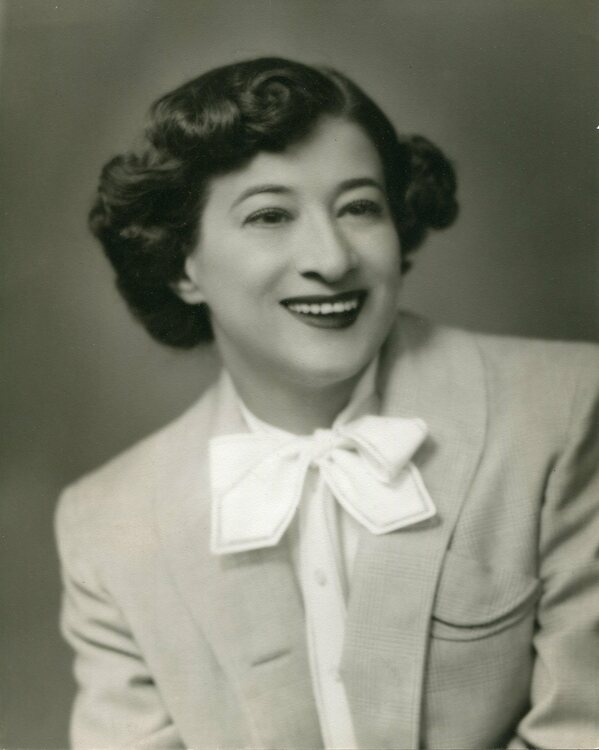
Fraydele Oysher
Fraydele was born in 1913 in Lipkany, Bessarabia, into a family whose father was one of seven generations of cantors. She immigrated to Montreal, Canada, when she was eight years old, along with her father, her mother and her brother Moyshe.
The children, both with magnificent voices and surrounded by an aura of religious music, were tutored in the chants of the synagogue. Moyshe went on to a career as an actor and star of classic Yiddish art films and was later America's legendary cantor known as "The Master Singer of His People."
Fraydele's first significant job was at the New York's Amphion Theatre, which was just across the Brooklyn Bridge. There she received a payment of eighteen dollars a week. The production was "alongside Sheindele the Khazante."
Fraydele recalls: "I went there one day and there was a big crowd standing outside. Just my luck, I thought, it's a fire and I'll be out of work. I asked somebody what was going on and he said, 'There's a little girl that sings here...' and the crowd was waiting to buy tickets. 'That's me', I said, and I went in and asked for a two-dollar raise."
When asked when she started on Second Avenue, she doesn't hesitate, "When they let me!" She was Second Avenue's Fraydele, "The Little Queen," "The Golden Girl," a large voice in a small body.
She fit perfectly into a favorite plot device: The Yeshiva boy who the audience discovers when it's time for the last act showstopper, is really a girl .... all this time before Streisand dreamed of Yentl. She was able to bring to the theatre the sound of the synagogue where it was a great novelty, and she was easily accepted, cleverly interspersed into shows written specifically for her vocal and comedic talents.
When Fraydele was a teen, the family settled in Philadelphia, and she found work in a pretzel factory, getting paid for every pretzel that didn't break. "Hating" the job, she begged her older brother Moyshe to take her to New York.
She was an olive-skinned gangly kid who made her way on her own without the help of her immigrant parents. As a teenager, she was often rejected by her father for not having been born male, but she would eventually catch his attention when she was accidentally heard singing to herself one day. Recognizing her gift, grandpa Selig Oysher promptly began tutoring her in cantorial repertoire, and he then sent her out to "make a dollar," If you had asked her how it all came about, she probably would have said, "I had to make a living. When Papa heard me singing to myself one day by accident, he sent me to work right away."
Quickly, she caught the attention of audiences with her great "pipes," charisma, and guts. Her rise was meteoric and she became a star well before her brother, the legendary cantor/actor, Moyshe Oysher.
She also was offered opportunities to sing as a female cantor in the synagogue, but times being what they were, she opted to remain on the stage. She didn't think of or refer to herself as a pioneer of feminism. However, long before the Jewish Reform movement came into being and women were embraced as rabbis and cantors in synagogues throughout the world, Fraydele Oysher was the woman who played the major role in paving this new road for women.
Fraydele's vocal and interpretive mastery of such diverse music as liturgical chants, theatre songs, and folk songs make the listener feel that they are hearing the piece for the first time.